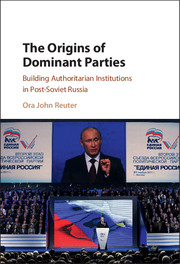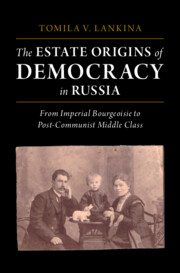The Origins of Dominant Parties
In many autocracies, regime leaders share power with a ruling party, which can help generate popular support and reduce conflict among key elites. Such ruling parties are often called dominant parties. In other regimes, leaders prefer to rule solely through some combination of charisma, patronage, and coercion, rather than sharing power with a dominant party. This book explains why dominant parties emerge in some nondemocratic regimes, but not in others. It offers a novel theory of dominant party emergence that centers on the balance of power between rulers and other elites. Drawing on extensive fieldwork in Russia, original data on Russian political elites, and cross-national statistical analysis, the book's findings shed new light on how modern autocracies work and why they break down. The book also provides new insights about the foundations of Vladimir Putin's regime and challenges several myths about the personalization of power under Putin.
- The first full-length study of the origins of dominant party regimes, shedding new light on why some countries democratize, but others do not
- Challenges a number of myths about the nature of political power in Putin's Russia
- Draws on an array of new empirical data, including original data on Russian political elites, extensive fieldwork in Russia, and cross-national quantitative data enriching understanding of both authoritarian and Russian politics
Reviews & endorsements
‘Reuter's impressive The Origins of Dominant Parties significantly revises our understanding of the United Russia Party's role in Russian politics. While many dismiss the party as little more than a shell held in place solely by Putin's personal appeal, this book shows that it plays a much more important role in Putin's regime than most experts currently think. This will be the go-to book for anyone wanting to know about United Russia, and essential reading for understanding Russian politics in the Putin era.' Henry Hale, George Washington University, Washington DC
'It comes as no surprise that autocratic leaders have incentives to create or govern with a ruling party since the institution is so helpful in promoting stability. But Reuter reminds us that ruling parties do not emerge through the efforts of leaders alone. They result from the decisions of hundreds of individual elites to link their fates to this institution. Why would they do so? The Origins of Dominant Parties provides a wealth of material on Russia in addition to cross-national evidence to show the conditions under which elites join ruling parties. Reuter convincingly shows that the formation of a dominant party is never a foregone conclusion, but instead is a dynamic process that relies on actors’ relative power and their ability to solve problems of commitment and collective action.' Jennifer Ghandi, Emory University, Atlanta
'Based on extensive fieldwork and deep knowledge of the case, Reuter’s deftly written story of the ups and downs of party-building in the post-Communist era is the definitive account of the construction of Russia’s ruling party. Just as importantly, his argument that it takes a delicate balance of elite and leadership incentives to build a dominant party is a major contribution to our understanding of contemporary dictatorships. This book is a must-read for students of authoritarianism throughout the world.' Graeme Robertson, University of North Carolina, Chapel Hill
Product details
April 2017Hardback
9781107171763
336 pages
236 × 160 × 24 mm
0.62kg
19 b/w illus.
Available
Table of Contents
- 1. Introduction
- 2. A theory of dominant party formation
- 3. False starts: the failure of pro-Presidential parties under Yeltsin
- 4. The emergence of a dominant party in Russia
- 5. United Russia as the dominant party
- 6. United Russia and Russia's governors
- 7. Economic elites and dominant party affiliation
- 8. Dominant party emergence around the world
- 9. Conclusion.







